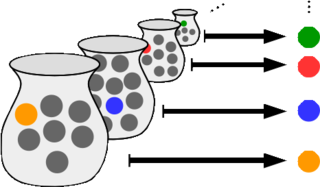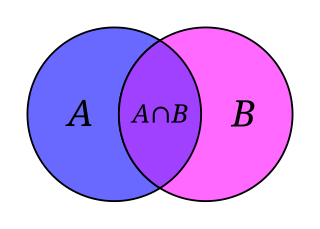This page is a list of articles related to set theory.
This page is a list of articles related to set theory.

In mathematics, the axiom of choice, or AC, is an axiom of set theory equivalent to the statement that a Cartesian product of a collection of non-empty sets is non-empty. Informally put, the axiom of choice says that given any collection of bins, each containing at least one object, it is possible to construct a set by arbitrarily choosing one object from each bin, even if the collection is infinite. Formally, it states that for every indexed family of nonempty sets, there exists an indexed set such that for every . The axiom of choice was formulated in 1904 by Ernst Zermelo in order to formalize his proof of the well-ordering theorem.
In mathematics, particularly set theory, a finite set is a set that has a finite number of elements. Informally, a finite set is a set which one could in principle count and finish counting. For example,
Mathematical logic is the study of formal logic within mathematics. Major subareas include model theory, proof theory, set theory, and recursion theory. Research in mathematical logic commonly addresses the mathematical properties of formal systems of logic such as their expressive or deductive power. However, it can also include uses of logic to characterize correct mathematical reasoning or to establish foundations of mathematics.

Set theory is the branch of mathematical logic that studies sets, which can be informally described as collections of objects. Although objects of any kind can be collected into a set, set theory, as a branch of mathematics, is mostly concerned with those that are relevant to mathematics as a whole.
In set theory, Zermelo–Fraenkel set theory, named after mathematicians Ernst Zermelo and Abraham Fraenkel, is an axiomatic system that was proposed in the early twentieth century in order to formulate a theory of sets free of paradoxes such as Russell's paradox. Today, Zermelo–Fraenkel set theory, with the historically controversial axiom of choice (AC) included, is the standard form of axiomatic set theory and as such is the most common foundation of mathematics. Zermelo–Fraenkel set theory with the axiom of choice included is abbreviated ZFC, where C stands for "choice", and ZF refers to the axioms of Zermelo–Fraenkel set theory with the axiom of choice excluded.

In mathematics, and particularly in set theory, category theory, type theory, and the foundations of mathematics, a universe is a collection that contains all the entities one wishes to consider in a given situation.
Zermelo set theory, as set out in a seminal paper in 1908 by Ernst Zermelo, is the ancestor of modern Zermelo–Fraenkel set theory (ZF) and its extensions, such as von Neumann–Bernays–Gödel set theory (NBG). It bears certain differences from its descendants, which are not always understood, and are frequently misquoted. This article sets out the original axioms, with the original text and original numbering.
In mathematics, two sets or classes A and B are equinumerous if there exists a one-to-one correspondence between them, that is, if there exists a function from A to B such that for every element y of B, there is exactly one element x of A with f(x) = y. Equinumerous sets are said to have the same cardinality. The study of cardinality is often called equinumerosity (equalness-of-number). The terms equipollence (equalness-of-strength) and equipotence (equalness-of-power) are sometimes used instead.
In mathematics, a non-measurable set is a set which cannot be assigned a meaningful "volume". The mathematical existence of such sets is construed to provide information about the notions of length, area and volume in formal set theory. In Zermelo–Fraenkel set theory, the axiom of choice entails that non-measurable subsets of exist.
The axiom of constructibility is a possible axiom for set theory in mathematics that asserts that every set is constructible. The axiom is usually written as V = L, where V and L denote the von Neumann universe and the constructible universe, respectively. The axiom, first investigated by Kurt Gödel, is inconsistent with the proposition that zero sharp exists and stronger large cardinal axioms. Generalizations of this axiom are explored in inner model theory.

In set theory, the axiom of limitation of size was proposed by John von Neumann in his 1925 axiom system for sets and classes. It formalizes the limitation of size principle, which avoids the paradoxes encountered in earlier formulations of set theory by recognizing that some classes are too big to be sets. Von Neumann realized that the paradoxes are caused by permitting these big classes to be members of a class. A class that is a member of a class is a set; a class that is not a set is a proper class. Every class is a subclass of V, the class of all sets. The axiom of limitation of size says that a class is a set if and only if it is smaller than V—that is, there is no function mapping it onto V. Usually, this axiom is stated in the equivalent form: A class is a proper class if and only if there is a function that maps it onto V.
An approach to the foundations of mathematics that is of relatively recent origin, Scott–Potter set theory is a collection of nested axiomatic set theories set out by the philosopher Michael Potter, building on earlier work by the mathematician Dana Scott and the philosopher George Boolos.
Logic is the formal science of using reason and is considered a branch of both philosophy and mathematics and to a lesser extent computer science. Logic investigates and classifies the structure of statements and arguments, both through the study of formal systems of inference and the study of arguments in natural language. The scope of logic can therefore be very large, ranging from core topics such as the study of fallacies and paradoxes, to specialized analyses of reasoning such as probability, correct reasoning, and arguments involving causality. One of the aims of logic is to identify the correct and incorrect inferences. Logicians study the criteria for the evaluation of arguments.
This article contains a discussion of paradoxes of set theory. As with most mathematical paradoxes, they generally reveal surprising and counter-intuitive mathematical results, rather than actual logical contradictions within modern axiomatic set theory.
In descriptive set theory, the Borel determinacy theorem states that any Gale–Stewart game whose payoff set is a Borel set is determined, meaning that one of the two players will have a winning strategy for the game. A Gale-Stewart game is a possibly infinite two-player game, where both players have perfect information and no randomness is involved.
This is a glossary of set theory.